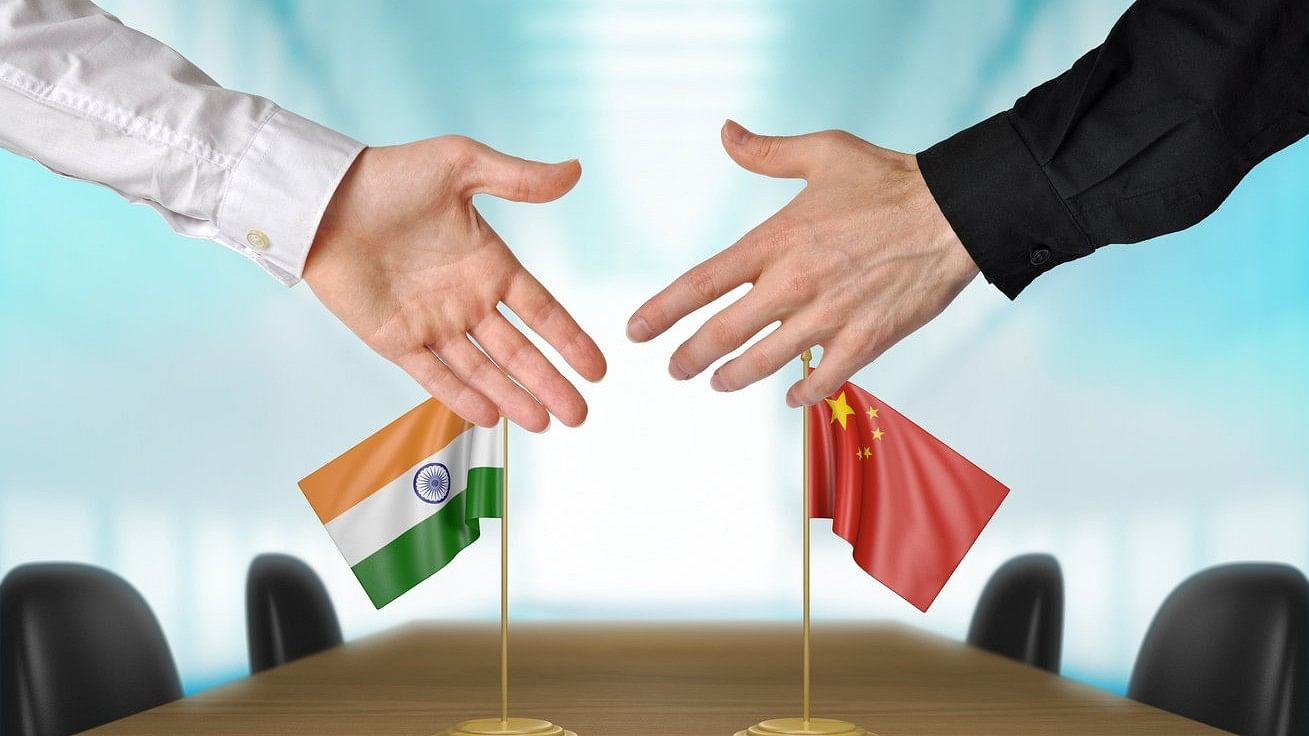
Representative image showing dealings between India and China
Credit: iStock Photo
A recalibration of India’s economic policy towards China involves both diplomatic and economic elements.
While the leopard will not change its spots, China is also under increasing domestic economic stress and international pressure for many reasons. India can, and should, align more closely on security matters with both the West and those of China’s neighbours threatened by it; but, it can and should also strike a more independent path when it comes to bilateral economic ties and Asian regionalism.
For instance, the European Commission has followed the Americans in setting high tariffs against Chinese electric vehicles (EVs). Since India is trying to grow its EV sector, it both needs Chinese imports as well as limits on them to encourage local manufacturing. How can the relevant Indian ministries come together to achieve this?
Policy changes required
As two Indian analysts have argued recently, non-tariff barriers (NTBs) are the way to go but only for China, and must be accompanied by liberalisation with other countries. India must, therefore, reconsider its opposition to regional trade arrangements. Not only will this push Indian industry to develop the stamina and muscle to compete with China, but it will also make it more attractive for Chinese investments. Short-term pain is inevitable, but the evidence also suggests that India will need more than the narrative of its large market to attract the kind of foreign investments in manufacturing required to generate large-scale employment, and for the Indian economy to truly take off.
However, if India is both uncompromising on security issues and willing to impose NTBs against China, how can it also get the latter to co-operate in technology transfer and investments? Given this, compromises must be possible in other areas.
International organisations that China has founded or is a major player in usually have both an anti-West function and a trade agenda for Beijing. India does not have to buy into the former but can make use of the latter. With its expansion, BRICS does not have a unifying logic, if it ever had one, but it still offers India an additional platform for economic engagement. The Prime Minister’s foreign delegations need to have a lot more officials from the ministries dealing with commerce and industry, small and medium enterprises, and infrastructure development, among others, than from the Ministry of External Affairs (MEA).
In the Shanghai Cooperation Organisation (SCO), China and Russia are the dominant players, but it is still an opportunity for India to engage politically and economically in a region that it has otherwise scant opportunities in despite long-standing historical connections and immense soft power. In this context, Prime Minister Narendra Modi’s decision to not attend the next SCO Summit in Astana, Kazakhstan early next month is a mistake.
It is probably on the China-Pakistan Economic Corridor (CPEC) — part of China’s Belt and Road Initiative (BRI) — that the greatest recalibration is necessary. India must continue to oppose the BRI, given one of the objectives of the Chinese project is to undermine regional and global order in favour of non-democratic, illiberal interests. However, the BRI’s economic dimension also offers India an opportunity to craft a more sophisticated economic and political approach.
Engaging with the CPEC does not have to be seen as undermining India’s sovereignty, but as an opportunity to develop additional levers of economic and political influence in Pakistan as part of the Prime Minister’s ‘neighbourhood first’ policy. Ignoring or boycotting the CPEC has the practical effect of outsourcing Pakistan policy to China, leaving India unable to influence Pakistani society and economic interest groups. At the same time, given the CPEC’s increasing travails, India can better leverage its participation to achieve its interests.
New Delhi should also reverse its de facto expulsion of Chinese journalists which has led to a similar expulsion of Indian journalists from China. The lack of Indian perspectives on the goings-on in China ultimately affect knowledge creation and policymaking in India, which then becomes ever more dependent on just the MEA or on Western sources. New Delhi can impose reasonable restrictions on Chinese journalists given that they are agents of the Party-state and not representatives of a free press, while simultaneously supporting Indian media houses to have at least as many Indian journalists in China as there are Chinese journalists in India; it might be a good idea to support business journalists, in particular.
The road ahead
Creative political and economic approaches will allow India greater leeway in policy towards China. India could impose stricter conditions for visas for Chinese technicians and businessmen, but also ensure that more visas are issued, and that too, in a timely fashion. New Delhi’s plans to insist on majority stakes for Indians in Chinese companies based in India will require greater thought. While it is right to call for Indianisation of top leadership in Chinese companies — this is exactly what China has itself insisted on with foreign investors after all — the government must also be able to continuously monitor and regulate Indian stakeholders and managements, and not assume its job is done merely with legal requirements.
These are measures that will require the government to overcome turf battles among ministries, and their lack of expertise in multiple domains. It will require constant vigilance and the ability to both scale up appropriate measures in volume and technologically as the situation demands. India’s relationship with China is among its most important bilateral relationships, and for this reason, it requires not just clarity and assertiveness but also finesse and long-term thinking.
[This is the second of a two-part series on India’s economic policy towards China].
(The writer teaches international relations at Shiv Nadar University, Delhi NCR.)
Disclaimer: The views expressed above are the author's own. They do not necessarily reflect the views of DH.